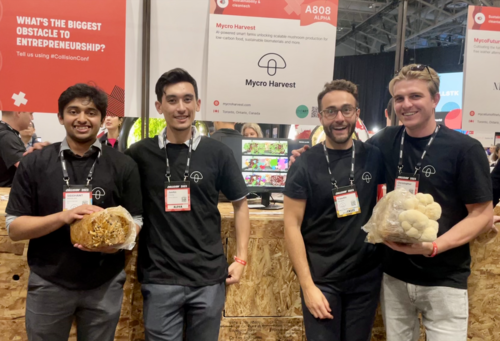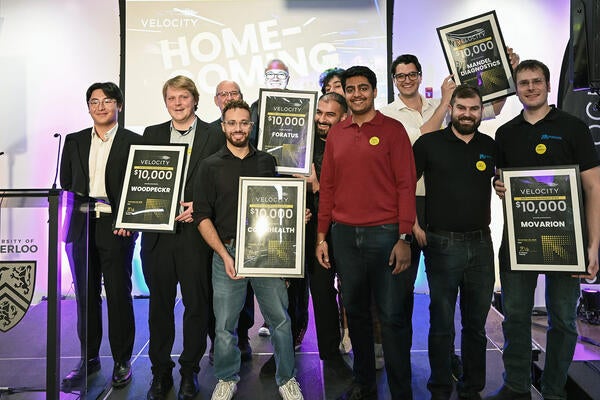
AI can grow mushrooms
AI-driven mushroom smart farm maker Mycro Harvest joins Velocity

AI-driven mushroom smart farm maker Mycro Harvest joins Velocity
By Media RelationsMushrooms are used to make plant-based meat alternatives, as a base for sustainable bioplastics, styrofoam alternatives, vegan leather products and more - so efficient and cost-effective fungi farming is foundational to bringing sustainable products into the hands of consumers. But currently, mushroom production is bottlenecked.
Enter Mycro Harvest, a startup that has recently joined Velocity, the University of Waterloo's incubator, to develop an artificial intelligence-driven mushroom smart farm.
"There is a whole ecosystem of alternative products that are currently unable to reach customers at scale because mushroom production itself isn't scalable. It's very difficult to run a profitable mushroom farm," said Christopher Klich, co-founder and CEO.

Mycro Harvest founders and interns at Collision.
Klich and Justin Cheng, co-founder, chief technical officer, and hobby mycologist, said mushroom farmers currently rely heavily on manual labour and inefficient processes requiring highly technical knowledge to avoid crop loss.
Mycro Harvest is developing a shipping container-sized unit that uses affordable automation combined with AI monitoring to grow mushrooms at scale. With integrated software, this method allows for constant monitoring, which automatically adjusts environmental conditions based on crop needs, protecting crops and increasing production while reducing labour costs.
The company will first focus on scaling production in the multi-billion-dollar fresh mushroom industry.
"We have developed our system to be very cost-effective and generate a return on investment quickly for farmers," Klich said. "Our product not only delivers huge value but is also accessible to become industry standard."
Before Klich and Cheng established Mycro Harvest, the two founders knew one thing — advancing sustainable development was their raison d’être.
"We wanted to do something that had a huge impact, and we wanted to focus on sustainability," said Klich. "The company we wanted to build would have a positive impact on the world."
Less than a year since founding Mycro Harvest, they have raised VC funding, secured grants, and were featured as the top impact-driven startup at the recent Collision tech conference in Toronto.
"Velocity instantly expedited our growth rate, including access to more funding, expert advisory and resources we couldn't have otherwise," said Cheng. "It's incredibly valuable to progress our prototyping and interacting with the ecosystem of driven founders who have been where we are at and are going through the same — keeps us motivated and inspired."

Read more
Here are the people and events behind some of this year’s most compelling Waterloo stories

Read more
It Started in Waterloo: An Astronaut's Journey into the Universe of Innovation, narrated by Chris Hadfield, highlights the University of Waterloo’s role in igniting innovation within the region and beyond.

Read more
Velocity’s $10K Momentum Grants help student builders become full-time founders
The University of Waterloo acknowledges that much of our work takes place on the traditional territory of the Neutral, Anishinaabeg, and Haudenosaunee peoples. Our main campus is situated on the Haldimand Tract, the land granted to the Six Nations that includes six miles on each side of the Grand River. Our active work toward reconciliation takes place across our campuses through research, learning, teaching, and community building, and is co-ordinated within the Office of Indigenous Relations.